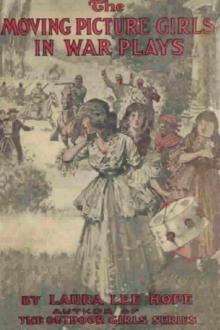An Island Story by H. E. Marshall (ebook pc reader .TXT) 📖

- Author: H. E. Marshall
- Performer: -
Book online «An Island Story by H. E. Marshall (ebook pc reader .TXT) 📖». Author H. E. Marshall
The anger and vengeance of the King did not end with the death of Monmouth. His soldiers, under a dreadful man called Kirke, tortured and murdered, in a terrible manner, the poor rebels who escaped from Sedgemoor. Judge Jeffreys followed next, and so many people did he kill, such terrible things did he do, that his journey through the country was for ever after called the Bloody Assize.
Assize means Court of Justice. At certain times in England judges make what is called a circuit or journey through the country, when they hear what wrong things people have done, and when they judge and punish. But on this dreadful journey Judge Jeffreys did not do justice. He did wrong and murder, and King James praised and rewarded him for it.
JAMES II. OF ENGLAND AND VII. OF SCOTLAND—THE STORY OF THE SEVEN BISHOPS
HAVING put down two rebellions, James made up his mind to turn Britain into a Roman Catholic country once more. It was against the law for a Roman Catholic to hold any public office but, in spite of that James began to turn away Protestants from many posts, and to put Roman Catholics in their places. The people grew more and more angry, but still James took his own way, growing bolder and bolder.
At last he issued what was called the Declaration of Indulgence. In this Declaration he said that all the laws against the Roman Catholics, and against all others who did not belong to the Church of England, and who were called Dissenters, were done away with.
James hated the Dissenters, that is the Puritans and Presbyterians, but he thought that if he made them free they would side with him and help him to free the Romish Church also. But they did not do so. They knew that James was breaking the laws of the land in issuing this Declaration, and they would not accept freedom in an unlawful manner.
The King ordered the Declaration to be read in all London churches on Sundays, 20th and 27th May, and in all country churches on Sundays, 3rd and 10th of June. But nearly every clergyman in London and in the country refused to obey.
After a great deal of talking and consulting seven bishops wrote out a paper, which they all signed. In this paper the bishops told the King that they could not obey him, not because they wished people who thought differently from themselves to be cruelly and unkindly treated, but because the laws against these people had been made by Parliament. They had been passed by King, Lords, and Commons, and could only be recalled by the consent of King, Lords, and Commons. The King alone, they reminded him, had no power to recall a law, and, in ordering the clergy to read the Declaration of Indulgence in the churches, the King was ordering them to break the law. This they refused to do.
By the time that this letter was written and signed, it was late on Friday evening. There was no time to be lost, and the bishops took it at once to the King.
He received them kindly, but when he read the letter his face grew dark and angry. “This is rebellion,” he said.
“Sire,” said the bishops, “we are not rebels. We are true to your Majesty. We wish to keep the laws of the land.”
“I tell you it is rebellion,” repeated James.
Then one of the bishops, who was called Trelawney, fell upon his knees. “Sire,” he cried, “do not say so hard a thing to us. No Trelawney can be a rebel. Remember that my family has fought for the crown. Remember how we served your Majesty against Monmouth.”
“We are ready to die at your Majesty’s feet,” cried another. “We helped to put down one rebellion, why should we raise another?”
“This is rebellion! This is rebellion, I will be obeyed!” replied the King, growing more and more angry. “I will keep this paper. I will remember you who have signed it. You are rebels. Go.”
The bishops went. But that very night copies of the letter which they had written to the King were printed and sold to thousands of joyful people, who in reading it knew that seven brave men were fighting for their freedom.
On Sunday morning the excitement was great. People crowded to the churches in thousands. Would the clergy read the Declaration, or would they not, was the question which everybody asked. It was soon answered. In only four of the hundred London churches was it read. In these four churches, as soon as the first words were heard the people rose and streamed out, so that when the reading was at an end the churches were silent and empty.
A week passed. The second Sunday came. Again thousands thronged to the churches. Again the Declaration was unread. Excitement grew. Another week passed. Would the country churches read the Declaration, or would they not? That question, too, was answered. The country clergy, like the London clergy, refused, and the land from end to end seemed to be filled with an outburst of joy.
Then the King ordered the seven bishops who had written the letter, and who had set the brave example, to be sent to the Tower. As soon as this became known the whole river was crowded with boats, and the banks thronged with people eager to see the bishops as they passed on their way to prison. When the bishops appeared, the people fell upon their knees begging for a blessing. All the way from Whitehall to the Tower the air was full of shouts of “God bless your Lordships!” It was like a royal procession, rather than like rebels being led to prison. As the bishops entered the Traitors’ Gate, the guards knelt before them begging, too, for a blessing, and in the guard-house the rough soldiers drank to the health of the brave bishops.
All next day, to the anger of the King, great people crowded to visit the bishops, to cheer and comfort them in prison. And when ten of the chief Dissenters went to see them, his anger knew no bounds. He called these Dissenters before him to scold them, and ask what they meant by visiting their enemies. “We are all Protestants,” they replied, “it is our duty to forget old quarrels, and stand by the men who are fighting for the liberties of the Protestant religion.”
For a week the bishops were kept in prison, while all over the country people wondered anxiously what would happen to them. Bishop Trelawney belonged to Cornwall. The people there loved him very much, and they made a song about him of which the chorus was:—
“And shall Trelawney die? and shall Trelawney die?
Then thirty thousand Cornish boys will know the reason why.”
After being kept in prison for a week the bishops were brought to court to be tried. The excitement was tremendous. The King and his friends did all they could to have the bishops punished. But it was in vain. The judges and the jury said that the bishops had done no wrong, and they were set free.
From street to street the joyful news spread like wildfire. Bells rang, cannon boomed, bonfires blazed, people cheered and wept and sang. Another battle had been fought for freedom, another victory won, and all England seemed mad with the joy of it.
At night, the houses were lit up; in nearly every window a row of seven candles appeared, one candle for each bishop. The streets were filled with rejoicing people, and not until day dawned, and the bells began to ring for morning service, did the weary, happy crowds go to their homes.
JAMES II. OF ENGLAND AND VII. OF SCOTLAND—WILLIAM THE DELIVERER
ANY one could see that the people were everywhere ready for rebellion. The King alone would not see it and went on in his own way. He was angry and sullen, but very obstinate. “I will not give way,” he said, “my father lost his head by giving way,” and he resolved to punish the people.
But James had gone too far. The people were weary of a Popish tyrant, and they made up their minds to have a Protestant King. So they asked William, Prince of Orange, to come to rule over them, the Prince against whom Charles II. had fought in the Dutch wars. William had some claim to the throne. I will explain how.
Charles I. had a daughter called Mary. She married a Prince of Orange called William, and their son, also called William, was now Prince of Orange. He was thus the nephew of Charles II. and of James II., and besides this he had married his cousin, Mary, the eldest daughter of James II.
Although their father, James, was a Roman Catholic, Mary and her sister, Anne, were both Protestants, and except for their little brother, who was at this time a tiny baby, Mary was the next heir to the throne of Britain.
So when the British saw that James meant to rule as a tyrant and that there was no hope of any freedom or happiness for them as long as he was King, they sent messages to Holland begging William to come to take the crown.
William consented to come, and began to gather his ships and men. And one day a letter reached James telling him what the Prince of Orange was doing. As James read, he turned pale and the letter dropped from his hand. He had thought that he might ill-treat the people as he liked. Now he discovered his mistake and tried to undo the evil he had done. It was too late. His people had forsaken him.
William was ready to sail, but for some days he was prevented because of the wind which blew from the west. At last it changed, and what was known for many years after as the “Protestant East Wind” began to blow.
It blew the Prince and his great fleet to the shores of Britain. More than six hundred ships swept over the water, led by William in his vessel called the Brill. From the masthead floated his standard, with the arms of Nassau and of Britain upon it, and in great shining letters the words, “I will maintain the liberties of England, and the Protestant religion.” By night the dark sea glittered for miles with lights. By day the white sails glimmered in the wintry sun.
Once before in our story a great conqueror called William had sailed to these shores with mighty ships and men. This was no conqueror, but a deliverer.
THE DELIVERER HAD COME.
On the 5th of November 1688 A.D., William landed at Torbay, in Devonshire. There the stone upon which he first placed his foot is still to be seen. Although now it is a town, then it was a little lonely village, and the Prince had to sleep the first night in a tiny thatched cottage. But over it, as proudly as over any castle, fluttered the great banner with its promise, “I will maintain the liberties of England and the Protestant religion.”
Through rain and wintry weather, over roads knee-deep in mud, the Prince and his army marched northward. Worn, wet, and muddy as they were, the people crowded everywhere along the way to cheer them. The Prince rode upon a beautiful white horse, a white feather was in his hat, and armor glittered upon his breast. His face was grave and stern, his eyes keen and watchful. He looked a soldier and





Comments (0)